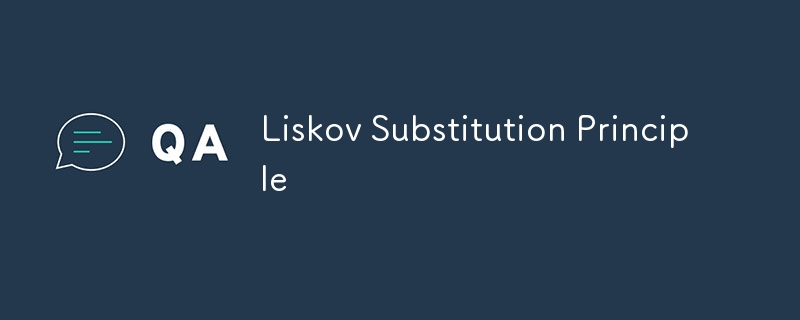リスコフ置換原理

オブジェクトは、コードの正確さに影響を与えることなく、そのサブタイプで置き換え可能である必要があります
これを継承(Is-a関係)で理解しましょう
例: ダチョウは鳥、せむしは車など
例: レーシングカーは車です
public class Car{
public double getCabinWidth(){
//return cabin width
}
}
public class RacingCar extends Car{
@Override
public double getCabinWidth(){
//UNIMPLEMENTED
}
public double getCockpitWidth(){
//return the cockpit width of the racing car
}
}
RacingCar は車クラスの getCabinWidth() をオーバーライドしますが、未実装のままにしておきます。これは、レーシング カーにはキャビン幅がないためです (F1 レーシング カーを見ると、内部スペースがありません。あるのはドライバーが座るコックピットだけです)
したがって、レーシングカーの室内空間はコックピットと呼ばれます。
注: レーシングカーには一般的な車と一致しない仕様がある可能性があります
public class CarUtil{
Car car1 = new Car();
Car car2 = new Car();
Car car3 = new RacingCar();
List<Car> myCars = new ArrayList<>();
myCars.add(car1);
myCars.add(car2);
myCars.add(car3);
// this will not work in 3rd iteration, because the getCabinWidth() in RacingCar is not implemented
for(Car car : myCars){
System.out.println(car.getCabinWidth());
}
}
for ループは 3 回目の反復で失敗するため、これは公開されたデザインです。
これを修正するには、継承そのものであるルートを攻撃する必要があります。
解決策 1 : (階層の破壊)
継承を解除する必要があります。代わりに、Car と RacingCar の両方に共通の親を考え出します
Vehicle という非常に汎用的な親クラスを作成します
public class Vehicle{
public double getInteriorWidth(){
//return the interior width
}
}
public class Car extends Vehicle{
@Override
public double getInteriorWidth(){
return this.getCabinWidth();
}
public double getCabinWidth(){
//return cabin width
}
}
public class RacingCar extends Vehicle{
@Override
public double getInteriorWidth(){
return this.getCockpitWidth();
}
public double getCockpitWidth(){
//return the cockpit width of the racing car
}
}
public class VehicleUtils{
Vehicle vehicle1 = new Car();
Vehicle vehicle2 = new Car();
Vehicle vehicle2 = new RacingCar();
List<Vehicle> vehicles = new ArrayList<>();
vehicles.add(vehicle1);
vehicles.add(vehicle2);
vehicles.add(vehicle3);
for(Vehicle vehicle : vehicles){
System.out.println(vehicle.getInteriorWidth());
}
}
**階層の破壊: 置換が失敗した場合、階層を破壊します
解決策 2: 聞かないで伝える
Amazon の別の例を見てみましょう
Amazon では、すべてのサードパーティ製品に対して x 額の割引を提供しています。
すべての自社製品を 1.5 倍で提供します (Amazon ベーシック 製品は Amazon の自社製品です)
public class Product{
public double discount = 20;//x amount of discount on all the third-party products on Amazon
public double getDiscount(){
return discount;
}
}
public class InHouseProduct extends Product{
public void applyDiscount(){
discount = discount*1.5;// 1.5 times more discount on InHouseProducts
}
}
public class PricingUtils{
Product p1 = new Product();
Product p2 = new Product();
Product p2 = new InHouseProduct();
List<Product> products = new ArrayList<>();
products.add(p1);
products.add(p2);
products.add(p2);
for(Product product : products){
if(product instanceOf InHouseProduct){
((InHouseProduct)product).applyDiscount();
}
System.out.println(product.getDiscount());
}
}
if ステートメントは、Liskov 置換原則に反します InHouseProduct の割引額の更新に関係していることに注意してください (オブジェクト Product をそのサブタイプ InHouseProduct に置き換えることができたはずです)。 if ステートメントでは、行うべきではない割引額を手動で更新しています。
InHouseProduct クラスを少し変更すると、この問題が解決されます
public class InHouseProduct extends Product{
@Override
public double getDiscount(){
applyDiscount();
return discount;
}
public void applyDiscount(){
discount = discount*1.5;
}
}
そして最後に PricingUtils クラスから if ステートメントを削除します
public class PricingUtils{
Product p1 = new Product();
Product p2 = new Product();
Product p2 = new InHouseProduct();
List<Product> products = new ArrayList<>();
products.add(p1);
products.add(p2);
products.add(p2);
for(Product product : products){
System.out.println(product.getDiscount());
}
}
尋ねないでください: ここでは、utils クラスにすべての割引を出力するように指示しています。utils クラスは何も尋ねる必要はありません (if で尋ねていたため)先ほどの発言)
以上がリスコフ置換原理の詳細内容です。詳細については、PHP 中国語 Web サイトの他の関連記事を参照してください。

ホットAIツール

Undresser.AI Undress
リアルなヌード写真を作成する AI 搭載アプリ

AI Clothes Remover
写真から衣服を削除するオンライン AI ツール。

Undress AI Tool
脱衣画像を無料で

Clothoff.io
AI衣類リムーバー

Video Face Swap
完全無料の AI 顔交換ツールを使用して、あらゆるビデオの顔を簡単に交換できます。

人気の記事

ホットツール

メモ帳++7.3.1
使いやすく無料のコードエディター

SublimeText3 中国語版
中国語版、とても使いやすい

ゼンドスタジオ 13.0.1
強力な PHP 統合開発環境

ドリームウィーバー CS6
ビジュアル Web 開発ツール

SublimeText3 Mac版
神レベルのコード編集ソフト(SublimeText3)

ホットトピック
 1675
1675
 14
14
 1429
1429
 52
52
 1333
1333
 25
25
 1278
1278
 29
29
 1257
1257
 24
24
 会社のセキュリティソフトウェアはアプリケーションの実行に失敗していますか?それをトラブルシューティングと解決する方法は?
Apr 19, 2025 pm 04:51 PM
会社のセキュリティソフトウェアはアプリケーションの実行に失敗していますか?それをトラブルシューティングと解決する方法は?
Apr 19, 2025 pm 04:51 PM
一部のアプリケーションが適切に機能しないようにする会社のセキュリティソフトウェアのトラブルシューティングとソリューション。多くの企業は、内部ネットワークセキュリティを確保するためにセキュリティソフトウェアを展開します。 ...
 名前を数値に変換してソートを実装し、グループの一貫性を維持するにはどうすればよいですか?
Apr 19, 2025 pm 11:30 PM
名前を数値に変換してソートを実装し、グループの一貫性を維持するにはどうすればよいですか?
Apr 19, 2025 pm 11:30 PM
多くのアプリケーションシナリオでソートを実装するために名前を数値に変換するソリューションでは、ユーザーはグループ、特に1つでソートする必要がある場合があります...
 MapsTructを使用したシステムドッキングのフィールドマッピングの問題を簡素化する方法は?
Apr 19, 2025 pm 06:21 PM
MapsTructを使用したシステムドッキングのフィールドマッピングの問題を簡素化する方法は?
Apr 19, 2025 pm 06:21 PM
システムドッキングでのフィールドマッピング処理は、システムドッキングを実行する際に難しい問題に遭遇することがよくあります。システムのインターフェイスフィールドを効果的にマッピングする方法A ...
 エンティティクラス変数名をエレガントに取得して、データベースクエリ条件を構築する方法は?
Apr 19, 2025 pm 11:42 PM
エンティティクラス変数名をエレガントに取得して、データベースクエリ条件を構築する方法は?
Apr 19, 2025 pm 11:42 PM
データベース操作にMyBatis-Plusまたはその他のORMフレームワークを使用する場合、エンティティクラスの属性名に基づいてクエリ条件を構築する必要があることがよくあります。あなたが毎回手動で...
 Intellijのアイデアは、ログを出力せずにSpring Bootプロジェクトのポート番号をどのように識別しますか?
Apr 19, 2025 pm 11:45 PM
Intellijのアイデアは、ログを出力せずにSpring Bootプロジェクトのポート番号をどのように識別しますか?
Apr 19, 2025 pm 11:45 PM
intellijideaultimatiateバージョンを使用してスプリングを開始します...
 Javaオブジェクトを配列に安全に変換する方法は?
Apr 19, 2025 pm 11:33 PM
Javaオブジェクトを配列に安全に変換する方法は?
Apr 19, 2025 pm 11:33 PM
Javaオブジェクトと配列の変換:リスクの詳細な議論と鋳造タイプ変換の正しい方法多くのJava初心者は、オブジェクトのアレイへの変換に遭遇します...
 eコマースプラットフォームSKUおよびSPUデータベースデザイン:ユーザー定義の属性と原因のない製品の両方を考慮する方法は?
Apr 19, 2025 pm 11:27 PM
eコマースプラットフォームSKUおよびSPUデータベースデザイン:ユーザー定義の属性と原因のない製品の両方を考慮する方法は?
Apr 19, 2025 pm 11:27 PM
eコマースプラットフォーム上のSKUおよびSPUテーブルの設計の詳細な説明この記事では、eコマースプラットフォームでのSKUとSPUのデータベース設計の問題、特にユーザー定義の販売を扱う方法について説明します。
 Redisキャッシュソリューションを使用して、製品ランキングリストの要件を効率的に実現する方法は?
Apr 19, 2025 pm 11:36 PM
Redisキャッシュソリューションを使用して、製品ランキングリストの要件を効率的に実現する方法は?
Apr 19, 2025 pm 11:36 PM
Redisキャッシュソリューションは、製品ランキングリストの要件をどのように実現しますか?開発プロセス中に、多くの場合、ランキングの要件に対処する必要があります。




